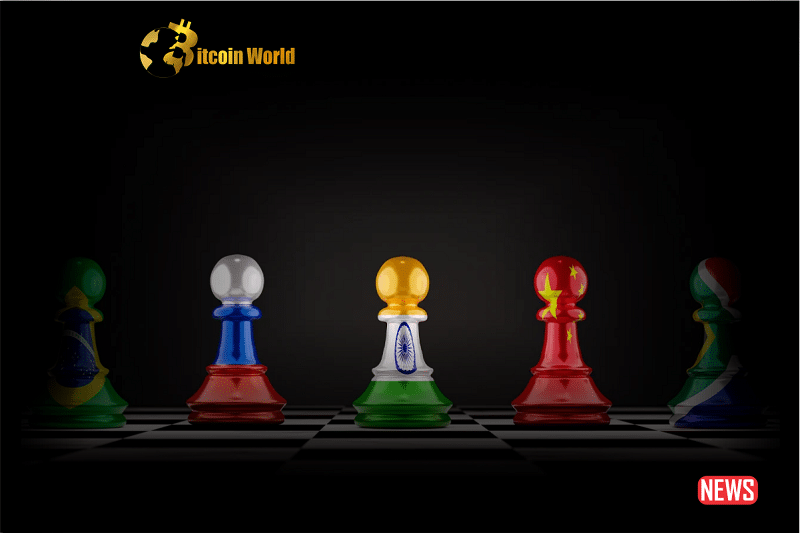Could the reign of the US dollar as the world’s reserve currency be facing a significant challenge? The BRICS economic coalition, comprised of Brazil, Russia, India, China, and South Africa, has its sights set on a bold ambition: creating a new global currency. Leslie Maasdorp, CFO of the New Development Bank (NDB), the financial arm of BRICS, recently shed light on this long-term goal. But what exactly does this mean for the global economic landscape?
What’s the Big Idea? A BRICS Currency to Rival the Dollar
The core idea is to move away from reliance on the US dollar for international trade and finance among BRICS nations. This isn’t an immediate plan, but rather a “medium to long-term ambition,” as Maasdorp stated. The goal is to facilitate direct trade in their own national currencies, reducing dependence on the dollar. Think of it as streamlining transactions and potentially lowering costs associated with currency conversions.
Why Is This Even Possible? The BRICS Powerhouse
The BRICS nations are not to be underestimated. Consider these facts:
- Massive Population: Collectively, they represent over 3 billion people – that’s more than 40% of the world’s population.
- Economic Muscle: Their combined GDP is a staggering $56.6 trillion, making them a significant force in the global economy.
- Growing Influence: Many other countries are eager to join the BRICS club, signaling a shift in global power dynamics.
The Road Ahead: Challenges and Realities
While the ambition is clear, the path to creating a new global currency is paved with challenges. Maasdorp himself acknowledged that the Chinese Renminbi, often seen as a potential contender, still has a long way to go before it can seriously challenge the dollar’s dominance. Currently, even the NDB relies heavily on the US dollar for its operations.
Key Hurdles for a BRICS Currency:
- Establishing Trust: A new currency needs global trust and stability.
- Economic Divergence: The BRICS nations have diverse economies and economic policies, which could complicate currency management.
- Technical Infrastructure: Building the necessary financial infrastructure for a global currency is a monumental task.
Who Else Wants In? The Expanding BRICS Family
The interest in joining BRICS is undeniable. Anil Sooklal, an African Ambassador, revealed that 13 countries from Africa, Latin America, and Asia have formally expressed their desire to become members. This growing interest underscores the appeal of an alternative to the existing Western-dominated financial system.
The Dollar Under Pressure? Economic Headwinds and Weaponization
The timing of this BRICS ambition is interesting, to say the least. HSBC Asset Management has warned of potential economic difficulties for the US, possibly leading to a global recession. Europe is also facing economic contraction. Furthermore, the US dollar’s role as a geopolitical tool has come under scrutiny.
The Weaponization of the Dollar:
- Following Russia’s invasion of Ukraine, the US imposed significant sanctions.
- These sanctions included restricting Russia’s access to foreign currency reserves.
- Russia was also banned from the SWIFT network, hindering international payments.
- Sanctions targeted Russian banks and energy companies.
Critics argue that while these measures aim to isolate Russia, they could inadvertently weaken the dollar’s global standing. The weaponization of the dollar might push nations to seek alternative payment systems and safe-haven assets.
Seeking Safe Havens: Gold and Crypto
When traditional currencies face uncertainty, investors often turn to safe havens. Gold, a time-tested store of value, is one such option. Interestingly, Bitcoin and other cryptocurrencies are also gaining traction as potential safe havens. Larry Fink, CEO of BlackRock, even suggests that Bitcoin is “digitizing gold,” highlighting its potential to disrupt the financial system.
What Does This Mean for the Future?
The BRICS push for a new global currency is a long-term play, not an overnight revolution. While the US dollar’s dominance isn’t likely to vanish immediately, the ambition itself signals a shifting global landscape. The increasing interest in joining BRICS and the concerns surrounding the weaponization of the dollar suggest a growing desire for alternatives. Whether the BRICS nations can successfully navigate the complexities of creating a new global currency remains to be seen, but the conversation has undoubtedly begun, and the implications for the future of global finance are significant.
Ultimately, the rise of a new global currency, or even the increased use of national currencies in trade, could lead to a more multi-polar financial world. This shift could bring both opportunities and challenges for businesses and individuals alike, requiring adaptability and a keen understanding of the evolving economic order.
Disclaimer: The information provided is not trading advice, Bitcoinworld.co.in holds no liability for any investments made based on the information provided on this page. We strongly recommend independent research and/or consultation with a qualified professional before making any investment decisions.


